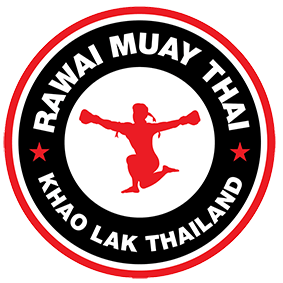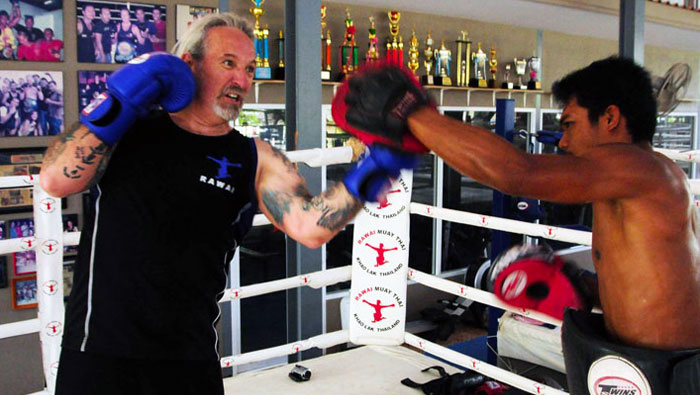How to Maximize your Training at Rawai Muay Thai
It’s not that easy coming from your home country all the way to Thailand and train 4 to 6 hours a day. With the heat, jet lag, and your current fitness level, it can be very taxing on the body. And although your decision to come here and train is indeed remarkable, training hard is one thing, training smart another. If you are not careful, your fitness holiday can take a turn for the worst.
At Rawai Muay Thai, where you get to train with some of the best Thai boxers, it won’t be a cakewalk for sure. But you’ll still want to take full advantage of your time, and get maximum results, right? So, take some advice: If you want to train hard then you must learn to recover hard.
When the stress keeps adding up
There are professional boxers training at our gym all the time. But these guys are on an entirely different level, with over 6 hours of training every day. A common question asked by students when they come to train at Rawai Muay Thai is “How do your Thai Fighters train so much?” They do massive runs in the morning before training, then train all morning and do massive runs again before their afternoon training. Then they repeat this, six days a week, sometimes 7. They don’t seem to get tired, and they don’t seem to get sick or injured. How do these guys do it for years while any regular person would have burnt out just after of a week such intense training?
What you don’t see is what the Thai fighters do when they are not training hard – and that is recovering hard. How do you release all that accumulated stress? Simply put, stress management. The secret is in building a high-stress tolerance level while having a systematic approach to release excess stress.
Introducing the Stress Bucket Model
Even seemingly healthy habits such as working out could lead to an overload of stress, if not done correctly. There are common fitness mistakes that many first-timers tend to make which ends up unnecessarily stressing their body. Even the experienced gym goer sometimes tends to miscalculate or even overestimate their body’s capacity, and end training more than is good for them, leading to a condition known as overtraining.
Stress can, however, take multiple forms, tackling which can sometimes be a challenge. The stress bucket model gives a very simple and obvious solution to stress management. Stress could be environmental, physiological or even psychological. The image below will make it easier to understand. Think of your body as a bucket. All the different of forms of stress such as, not getting enough sleep, work tensions, money problem, relationship problem etc. keep getting added to the bucket, slowly filling it up. Although the capacity of that bucket, will differ from person to person, depending on how healthy they are, what is for sure, is that at some point the bucket will overflow, leading to many complications that severely affects the health of the person. But that is just half of the story.
Why is recovery so important?
The other half concentrates on releasing all that accumulated stress. In the image above, see that little tap on the bucket? That tap represents the outlet through which you can release some of your stress. The outlet too can take multiple forms, such as getting good sound sleep, healthy diet, massage etc. These are the activities that sort of punch holes in the stress bucket and help release that accumulated stress.
The Stress Bucket is an excellent analogy of how Stress works in the body and by stress, I mean Cortisol. Cortisol is the hormone your body produces at times of duress, for example being in a Muay Thai fight or perhaps you are in a situation where you need to run, very fast, away from the danger. Your body from an evolutionary standpoint has an inbuilt self-defense mechanism for such situations. When you find yourself in a potentially life-threatening situation, your brain sends a signal to your thyroid to injects a ton of adrenaline and cortisol into your body, to prepare you for this fight or flight kind of, life-threatening situation. Suddenly, your brain gets super alert and hyper-stimulated, your muscles get tense, engaged and ready for action, prepared to run away from danger, or fight for your life!
For your body to produce cortisol, it doesn’t always have to be an epic life-threatening event either. Cortisol does have a natural and useful place in your system. Being worried can produce cortisol, eating bad food or alcohol can be a stress on your digestive system, family or relationship issues can create stress, lack of sleep is a big one, top that off by putting your body through 6 hours of Muay Thai Training – that’s a stress overload bound to break your Stress Bucket.
When the Stress Bucket overflows
When the stress bucket gets full and overflows, that’s when things start taking a turn for the worst. In reference to your training, you can begin to feel low on energy, you will fall into adrenal fatigue, your immune system will start crashing, and you end up getting sick and unable to train. The “Hero’s” that push through even the sickness, will just end up getting injured as excess cortisol in your system will make you very susceptible to injuries.
Too much stress in your system can also lead to depression, loss of sexual drive and robs your body’s ability to produce anabolic hormones like Testosterone that is needed to build that lean muscle mass. Cortisol also affects your body’s ability to store energy in your muscles from the food that you eat.
So how to make the most of your Muay Thai Training?
We have seen what happens when too much stress gets accumulated. It is essential that you have a system in place to release some of that stress, to avoid such critical conditions. So, how do you get the most from your training at Rawai Muay Thai and maximize the results? Well simply put, don’t break that stress bucket of yours! There are lots of things you can do to relieve stress whilst at the gym to empty that stress bucket before it overflows. Simple steps like going to bed early so you can get plenty of rest before the morning training session, avoid bad foods and over doing it on the alcohol. I know you are on holiday, but it will be detrimental to your training and end game goals.
The time immediately after a heavy training session is crucial when it comes to releasing the stress from the workout. Some activities help to quickly shift the body from a catabolic state to an anabolic one, where it can begin recovery. There are few options you can try, and massage is one such great option. If your muscles are getting sore try getting a message from our Khao Lak Massage shop, Khun Namfon is awesome and will fix you up in only a few sessions. Foam Rolling is an excellent and low-cost method to help release stress and sore muscles.
I would also recommend adding some of our Yoga classes to your training routine. Generally, it is the men that shy away from taking yoga classes, thinking it is not good enough or unnecessary for them, the Benefits of yoga for men, however, suggest otherwise. Yoga can help relieve stress and stretch out those tight muscles that can lead to additional tension on your body when you are not training. Especially, if you are also training in martial arts, then these benefits of Yoga for martial arts will tell you, exactly why, this ancient fitness system is so effective.
Our lifestyle and many ambitions tend to stress out the body too much. We have shared here today, the importance of maintaining a balance between activities that add stress, and those that help release it. If you know of someone who likes to train their body a lot, then sharing this article could be of great of help to them. And if you’ve ever tried a similar approach, share your experience and inspire others by commenting below.


